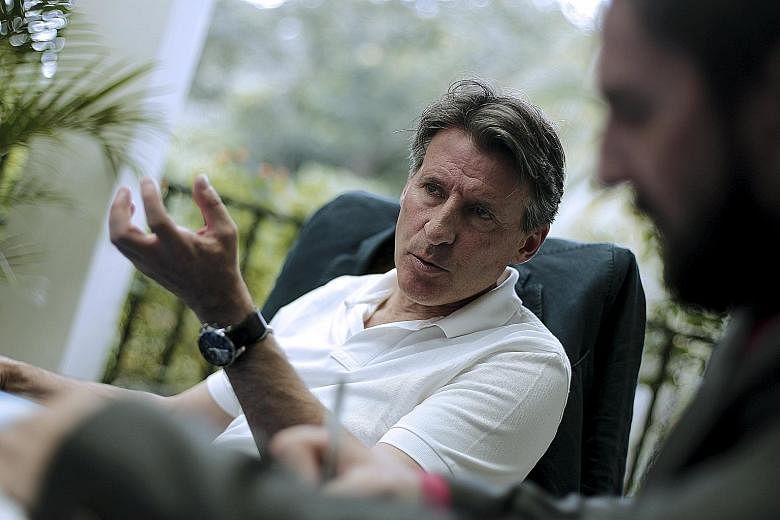Ten years have passed since Lord Sebastian Coe and Prime Minister Tony Blair beguiled the International Olympic Committee in Singapore over the Olympic legacy question.
The key to granting London the 2012 Summer Games was Coe's stirring oratory. He promised the old Olympians that their votes would this time not end in building ghostly white elephants, abandoned after the event.
He described the regeneration of the East End of London, a wretchedly neglected side of the capital city.
Above all he spoke of the youth, of tomorrow's children inspired in an old sporting nation to rise up and become sportsmen and women for generations.
"Your votes," he said, "provide the most fantastic opportunity to do everything we ever dreamed of in British sport."
The Games were great, no question about that. But the legacy?
Where to begin? The Olympic Park is certainly a greener place than before. The buildings are monuments, all manner of regeneration is going on (much of it by property developers from Qatar and China for example).
The heart of it all, the Olympic Stadium, is getting a £272 million (S$584 million) refit (taking the total cost to nearly £1 billion of public money) so that, rather than a disused monument to 2012, it will be handed over to West Ham United as a football stadium.
There are plenty of awkward questions over that. Hammers followers preferred their ancestral home, the Boleyn Ground, where the Claret and Blues have played for 110 years. But that is no longer an option.
The porn, rather than pawn, brokers who own West Ham have sold the ground as a real estate project. They didn't quite get the £71.2 million they wanted, and the figure is not disclosed, but West Ham's vice-chairman, TV celebrity Lady Karren Brady, says the deal she negotiated will "regenerate the area".
That word regeneration again. Some 838 new homes and retail outlets are planned by 2018.
Meanwhile, enriched by that sale, the club has agreed to contribute £15 million for the conversion costs of the Olympic Stadium into a 54,000-seat football arena. West Ham will then pay rent of between £2 million and £2.5 million per year to occupy the premises.
The leasehold runs 99 years, and West Ham's take from the new TV deal starting next year is coincidentally £99 million. Everyone has their fingers crossed that the team actually stay in the Premier League this season.
But all of the above is only a legacy in buildings and promises. The most appealing words that Seb Coe traded for votes alluded to the stimulation to a nation that gave many sports to the world, but that had grown distressingly lazy on the sports fields.
What of that dream?
Some sports, cycling for example, have taken off in a big way as a result of Olympic gold in the velodrome. Others, alas, have dropped off alarmingly.
The slogan of the London Games was to "Inspire a Generation".
Alas, the latest figures from Sport England suggest that the build-up to Games euphoria was somewhat more inspiring than the post-Games period.
Apparently some 15.49 million Britons over 16 years of age do some sport once a week.That is less than half the population. It is a million more than in 2006, but down markedly on a year ago. In the last six months alone the numbers have fallen by 222,000 people.
Tracey Crouch, the new sports minister, says she intends to develop a new strategy to get people up and running, or swimming, or working out in the gym, "as a matter of urgency."
No one is saying that government cuts, across all sectors of the welfare society, will be increased for sport. No one can quantify what legacy, other than the gold medals won in 2012, will endure.
If a society has grown more sedentary in spite of the glow of being Olympic hosts (and winners) then what can an indebted nation do to reverse that trend?
I have a suspicion that funding elite achievers to the hilt, and putting them on a pedestal, might actually be counter-effective.
We all look at the podium, we see the winners and runners-up, and we know every drop of sweat, every obsessive life sacrifice that put them there.
That, in itself, is not necessarily wholesome. It is a deviation from the sound mind in sound body principle of the Ancient Greek ideals on which the Olympics were founded.
"Faster, higher, stronger" is the motto, and Coe is aiming for that in his own life. He is standing for the presidency of his own sport, track and field athletics. And Coe is an angry Lord at the moment.
The Sunday Times newspaper, and the German TV station ARD, published and broadcast leaked documents that suggest the IAAF, the body Coe aspires to lead, has been sitting on documentation alleging that hundreds of athletes had suspicious blood level findings between 2001 and 2012.
Coe is furious. Not at his sport in which known drug cheats keep on coming back after temporary bans, but at experts and journalists who are mere messengers.
"It is a declaration of war on my sport," he said this week. "I take pretty grave exception to that."
While sports leaders like him want to inspire a generation, and want governments to spend billions to put winners in the highest circles, their duty must be to do all in their power on two fronts: To ensure that sports are clean and good for the human race; and that cheats will not prosper.
That is the legacy we should all applaud.


